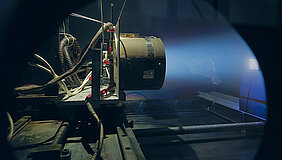Private space travel is booming – more and more satellites are being launched into space. At the Leibniz Institute of Surface Engineering (IOM) in Leipzig, researchers in the field of “Tools” are therefore developing standards and test procedures for electric satellite propulsion systems. The aim is to create a seal of quality – a kind of “TÜV” for space.
Chemical rockets launch satellites into space, but efficient ion propulsion systems provide movement in orbit. These require little fuel and are therefore becoming increasingly widespread. However, there are no established standards for determining their performance data – each supplier measures according to its own methods, which makes comparison difficult.
At the IOM laboratory, scientists test propulsion systems under space-like conditions. Using laser radiation, they measure, for example, the velocities of atoms and ions in the propulsion beam, thereby contributing to a better understanding of the engines.
In the DLR-funded Ref4EP joint project, researchers from the IOM, JLU, and THM in Giessen, as well as the CAU in Kiel, are developing references for jet diagnostic procedures. A reference engine is being built at the IOM for this purpose. This could eventually lead to a European standard and later a seal of quality for tested engines – an important contribution by Germany to private space travel.
You can find the detailed article with interview from MDR.DE at: Warum private Raumfahrt einen Weltraum-TÜV aus Leipzig braucht | MDR.DE

